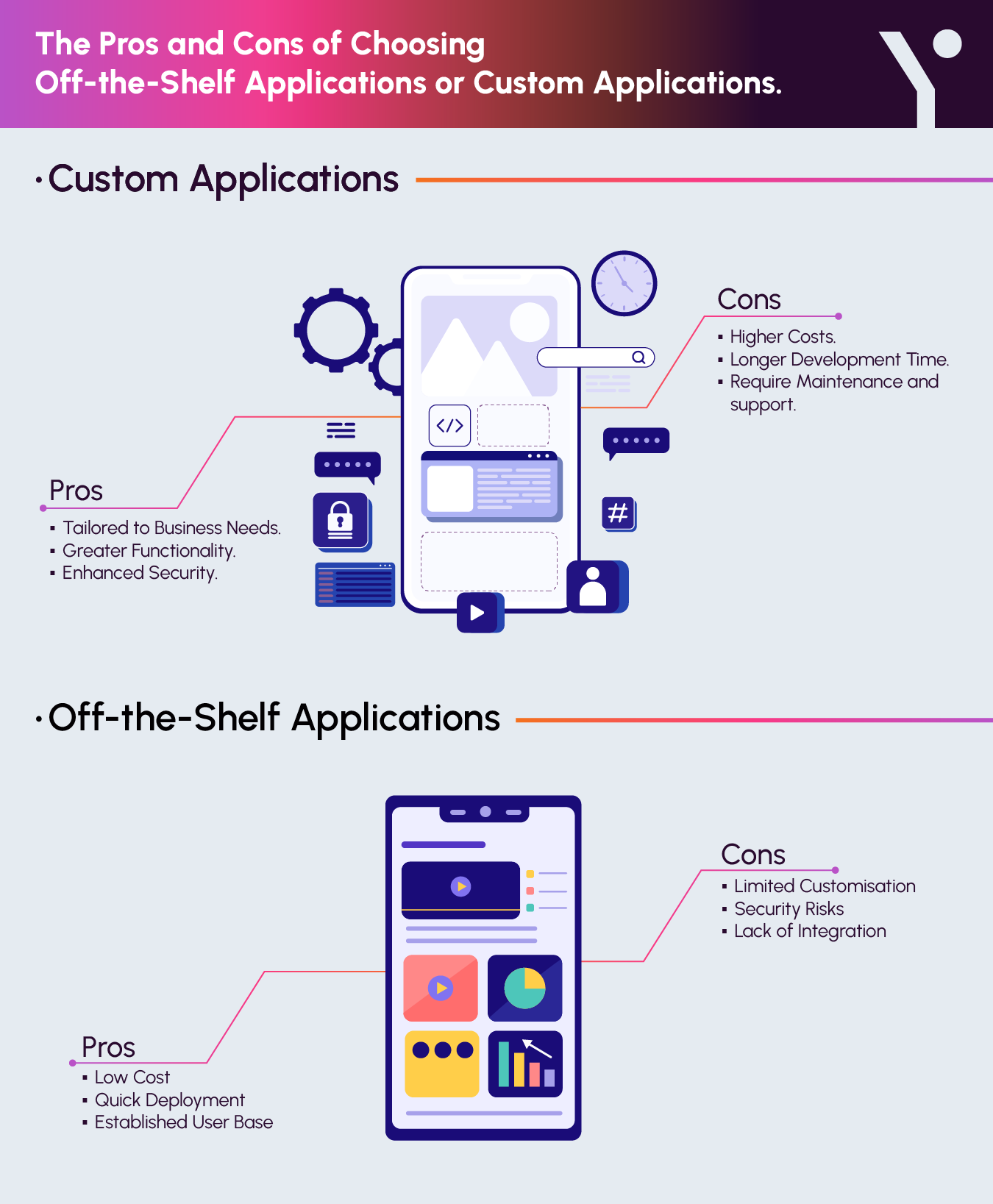Business application development plays a crucial role in how your business operates and grows. In this article, we will cover:
- What is Business Application Development?
- Why Business Applications Development should be part of your strategy
- The different types of Business Applications
- The pros and cons of choosing custom apps versus off-the-shelf solutions
What is Business Application Development?
Mobile applications are creating a positive impact in businesses all over the world. From better user experience to streamlined processes within the organisation, incorporating business application development in your corporate strategy is the future in the digital era.
According to studies, 85% of shoppers prefer apps over mobile websites for online shopping. This just goes to show that apps are a preferred method of conducting transactions.
Businesses will not only benefit on the consumer side of things but also regarding internal processes. Several business owners have agreed that business applications have helped them automate processes and minimise the time taken to get a task done, improving efficiency and minimising the risk of human error.
In this article, we will discuss what business application development is and how it can be used to advance your corporate strategy.
Just like any application, business application development is the creation of software or solutions that are geared towards improving business functions, enhancing transparency and helping businesses gain consumer insights to make better-informed decisions.
The best part about business application development is the customisation. While there are several tools and solutions that are ready to use, by developing your own application, you can integrate all your requirements into a single platform to get rid of unnecessary features and focus on the aspects of the business which are most important to you.
These solutions contribute towards the efficiency, productivity, and success of an organisation by addressing specific business challenges and supporting strategic objectives.
Why You Should Include Business Application Development in Your Corporate Strategy?
Just like marketing or sales, business application development needs to be a part of a successful corporate strategy. This approach will not only benefit your business from a customer-facing perspective but also improve processes within the organization.
Here are some reasons why business applications development is important and how it can help you grow:
Boost Efficiency
Internal applications can significantly impact employee productivity when it comes to efficiency. By automating certain aspects of your processes and reallocating resources to other tasks, you will see a substantial increase in the effectiveness of your operations.
Furthermore, these internal applications can also help improve collaboration between team members and facilitate remote work settings.
Improve Communication
Business applications can be designed to simplify workplace communication. This will allow employees to have crucial business-related information at all times. From sharing data, sales tools, business news and more, communication apps can play a huge role in how your organisation performs.
Strengthen Customer Relationship
According to recent studies, 76% of consumers prefer shopping on their phones to save time. Furthermore, payments through mobile applications are expected to reach 52.2% in 2024.
With an application, you increase your customer convenience and in turn your customer satisfaction. By eliminating the need for customers to wait for websites to load and enabling simplified transaction gateways, you can build a better relationship with your customer, building a loyal customer base.
Provide Meaningful Insights
Certain business applications allow you to extract insights from your consumer’s buying behaviour. These insights can be used for various business operations such as improving marketing strategies.
The ability to collect real-time insights and engagements can help you improve your customer relationship with improved strategies and enhance your business processes.
Optimise Marketing Strategies
With the help of a business application, you can develop a direct marketing channel. This will allow you to push targeted marketing efforts to consumer throughout their lifecycle.
Studies suggest that a customer is more likely to make a purchase from a business application rather than a website. This is why business application tools are not only necessary for consumers but also for marketers to improve their marketing activities.
Reduce Errors That Incur Costs
One of the major benefits of business applications is its ability to automate repetitive tasks. The risk of human error is always present and some of these errors can loss of revenues, damages to reputations and even heavy fines.
Business applications development is a great way of reducing these errors and making your business efforts more efficient.
Types Of Business Application Development
Business applications can be used both internally and externally in combination with other applications. While these applications can be purchased as off-shelf solutions, most businesses prefer to get custom business applications that are geared towards specific business requirements.
There are generally three types of business apps to choose from depending on your needs and budget.
B2B Applications
The first type of business applications are B2B or business-to-business apps. These are used to collaborate between business partners, for example, retailers and manufacturers. These applications are accessed using dedicated lines to minimise the risk of data leakage and breach due to the sensitive nature of the data that is exchanged on these platforms.
B2B applications are designed to streamline business operations and simplify complex business processes. Some of the most common B2B applications include:
1. Buy-side B2B enterprise application:
Buy-side B2B applications are designed to facilitate the procurement process within a business. Some Buy-side B2B applications offer pre-negotiated pricing to avoid constant back and forth and improve time efficiency. It also features an automated procurement approval process, giving you complete control over all your business purchases.
2. Sell-side B2B enterprise application:
These apps are used by companies to sell their goods and services to other businesses. The apps can be integrated into personal B2B sites to help centralise the entire B2B process.
3. E-marketplace B2B enterprise application:
B2B applications for e-marketplaces help businesses connect to the buyer to help them carry out their business transactions on an intermediary online marketplace. This application eliminates the need for a middleman, improving the efficiency of all business transactions and making it cost-effective.
B2C Applications
The next type of business applications are B2C or business-to-customer apps which are designed to be customer-facing. These are the apps that people use daily, from online stores to other apps that are generally found on the app store.
The main goal of B2C apps is to create convenience for customers by helping them complete specific tasks quickly. There are various forms of B2C apps:
- eCommerce apps:
E-commerce applications are specifically designed to serve as a platform to create virtual shops for consumers. Some of the popular eCommerce apps include Zyro, Shopify, Wix, and BigCommerce.
2. Loyalty apps:
Loyalty apps are popular amongst consumers as they allow people to earn loyalty points through mobile devices and track their growth. The points would then translate to rewards that can be redeemed in various ways. Customers earn points by shopping, referring friends, or sharing their experiences.
3. Stand-alone apps:
Generally, B2C apps tend to be more labour-intensive and costlier to implement. This is because they require frequent updates in response to user feedback and customers’ changing needs.
Since they rely on regular users and downloads to determine their success, they must be continually maintained and updated. In general, B2C applications should be more competitive since you rely on the apps to make sales.
Book A Free Consultation Session & Discuss Ideas With Experts!Internal Applications
Finally, internal apps are dedicated to internal use. These are regarded as core enterprise apps that are designed to deal with crucial business functions such as the Internal ERP systems and HR processes.
Following are some of the examples of internal business applications that we see on a daily basis:
- Human Resource Information Systems (HRIS)
- Inventory Control Systems
- Communication Software
- Accounting Software
- Reservation Software
- Schedule Management Systems
- Demand Forecasting Software
Pros and Cons Of Off-Shelf and Custom Applications
There are several factors that determine whether an application should be customised, or an off-the-shelf app would suffice. These factors can include, business requirements, level of customisations, required functionality and more.
The following infographic will define the pros and cons of each type of application and what to consider when choosing one.

Off the Shelf Applications
| Pros | Cons |
| Low Cost | Limited Customisation |
| Quick Deployment | Security Risks |
| Established User Base | Lack of Integration |
Custom Applications
| Pros | Cons |
| Tailored to Business Needs | Higher Costs |
| Greater Functionality | Longer Development Time |
| Enhanced Security | Require Maintenance and support |
Tired of the same old inefficiencies? We’ve got the tech to transform your business.
Must-Have Features in Business Application Development
When building a custom business app, features matter just as much as design. Here's what every solid Business Application Development project should include:
User-Friendly Interface
A clean, intuitive interface keeps users engaged. If your app feels complicated, people won’t use it—no matter how powerful it is.
Scalability
Build with growth in mind. A scalable architecture ensures your Business Applications Development investment supports more users, data, and features over time.
API Integrations
Your app should work with tools you already rely on—like CRMs, ERPs, or payment gateways. Good API integration streamlines your operations and saves time.
Role-Based Access Control
Keep your data secure. With role-based permissions, users only access what they need—nothing more, nothing less.
Real-Time Data Sync
Instant updates across devices and teams prevent errors, delays, and duplicated work. This is key for accuracy and decision-making.
Offline Functionality
Your team shouldn’t stop working just because there’s no internet. Offline support ensures access to critical features, with auto-sync once reconnected.
Robust Security Standards
Protect sensitive business data with encryption, secure logins, and compliance with regulations like GDPR or HIPAA where applicable.
Push Notifications
Keep users informed with real-time updates, alerts, or reminders. It's a powerful tool to boost engagement and retention.
Analytics Dashboard
Track key metrics—like usage, sales, or user behaviour—directly from your app. Data insights drive better decisions.
Web App vs Mobile App Comparison
|
Feature |
Web App |
Mobile App |
|
Accessibility |
Via browser |
Installed on device |
|
Offline Functionality |
Limited |
Yes (with native app) |
|
Speed & UX |
Slower |
Optimised & faster |
|
Maintenance |
Easier |
More complex |
|
Best For |
Internal tools, dashboards |
Loyalty programs, eCommerce |
Still unsure about your business application development? Start with a web app if you're testing the waters or focusing on internal tools. Go mobile-first if customer convenience, offline access, or real-time features are a priority.
Conclusion
Business application development can play a pivotal role in your daily operations and processes. Whether you are looking to collaborate with other businesses, your customers or internally within the team, the best mobile app developers can make all the difference.
At FuturByte, we will help you in your process of business application development and create an application for you that is designed to streamline your workflow and help you take maximum advantage of your resources by automating routine tasks and allowing you to focus on simplifying your operations.
Get a free consultation today and learn how a business application can help your business on the path to success.
Ready to streamline your operations? Let’s build a custom solution that works for you.
Frequently Asked Questions
We specialize in developing a wide range of business applications, including but not limited to custom enterprise solutions, CRM systems, workflow automation tools, data analytics platforms, and mobile applications tailored to meet specific business needs.
We implement industry-standard encryption, secure coding practices, and conduct regular security audits to safeguard sensitive data and protect against potential threats.
We have extensive experience in integrating business applications with existing software, legacy systems, and third-party tools. Our goal is to create a seamless and connected digital ecosystem for your business.
The development timeline varies based on the complexity and scope of the project. After a thorough consultation and requirement analysis, we provide a detailed timeline to give you a clear understanding of the development process.
We have expertise in developing cross-platform business applications that run seamlessly on both web and mobile devices. This ensures your applications are accessible to users across various platforms.
Custom business applications development offers tailored solutions that meet specific business needs, enhanced security, and greater functionality. However, it often comes with higher costs and longer development times compared to off-the-shelf solutions.
To begin, assess your business needs and identify areas for improvement. Then, consult with a development team, like FuturByte, to discuss your ideas and explore the best solutions for your organisation.
Business app development costs depend on a few important things: Platform choice: Are you building for iOS, Android, web, or all three? The more platforms you choose, the higher the cost due to design, development, and testing needs. Type of app: A custom-built app requires more time and budget but offers greater flexibility and long-term value compared to off-the-shelf solutions. Custom business applications development is ideal for companies with unique workflows or specific user needs. Complexity of features: Apps with advanced elements like real-time tracking, payment gateways, or API integrations will naturally cost more due to the time and expertise required. Expert tip: If you're just getting started with business application development, it's smart to launch with an MVP (Minimum Viable Product). This gives you a functional app with core features, keeps costs lower, and gives you room to grow.
There’s no one-size-fits-all answer. Costs for business applications development typically range from $10,000 to $150,000+, depending on: Scope of the project Tech stack used Level of customisation Number of platforms (iOS, Android, Web) To get a realistic estimate, speak to an experienced business app development company and outline your goals and requirements clearly. The more detailed your brief, the more accurate the quote.
Have questions or feedback?
Get in touch with us and we‘l get back to you and help as soon as we can!




